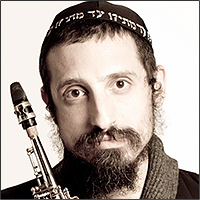Daniel Zamir
// saxophonist & vocalistDANIEL ZAMIR is a Klezmer-Jazz saxophone player and vocalist from Petah Tikva, Israel. His band Satlah’s “Satlah (Self-Titled)” (2000), “Exodus [Live]” (2001), “Children Of Israel” (2002), and recording of Masada’s “Nevalah” appears on John Zorn’s “Masada Anniversary Edition Vol. 2: Voices In The Wilderness [2CD]” (2003) all available from Tzadik Records. Daniel Zamir’s “Amen” (2006) is available from Hatav Hashmini, and “I Believe” (2008) will be available from Tzadik Records.
MySpace: www.myspace.com/danielzamir
Photo: Daniel Zamir
Interview:
According to the Jewish tradition, music is a very significant vessel in worshiping G-D. Music is a very abstract form of communication, and the Chassidic tradition says, music enables a person to express ideas that are impossible to express in words. The Chassidic tradition of Lubavitch actually incorporates music as part of the prayers and religious gathering, and in an outstanding way, Lubavitcher Chassidus has a regular “Nigunim session”, which means singing session of Chassidic Nigunim (deep songs) at the peak of the Sabbath ritual, around sunset every Saturday. In a way, I feel that music is a channel for me to reach high spiritual places that are impossible for me to reach otherwise. Especially playing improvised music, where my control as the player is significantly limited, puts me in a place where I have to trust G-D, and just let Him play through me. In that sense, the music reaches a level similar to prophecy, as the prophet cannot do anything from himself, but must let everything go, and give G-D the control of what happens, hence reaching a very high spiritual level. Most importantly, the first form of performed music known to us was at the holy temple in Jerusalem, where the daily rituals were always accompanied with live music. Up to the point where the Levites were officially anointed to be the ones in charge of the huge orchestra and choir, about one-thousand people, which shows how significant the role of music is in the Jewish ritual, and the strong spiritual force music has.
“I feel that music is a channel for me to reach high spiritual places that are impossible for me to reach otherwise.”
– Daniel Zamir, saxophonist and vocalist


